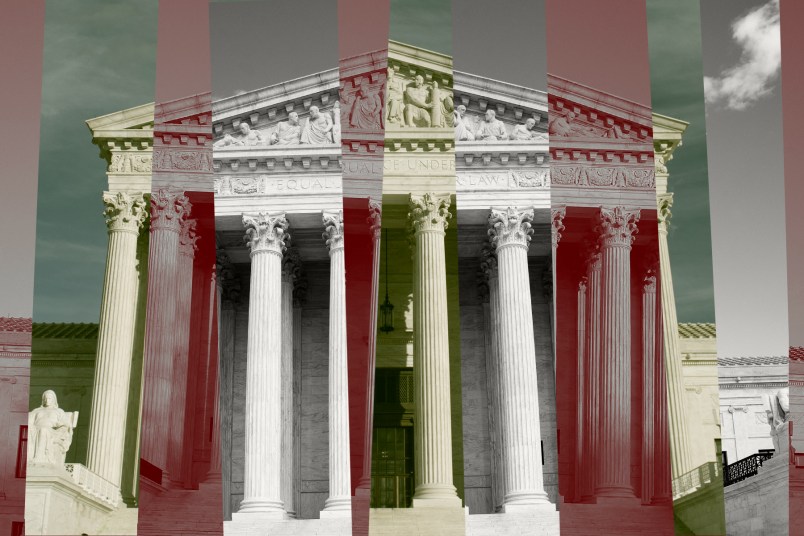The Supreme Court announced Wednesday that it will hear arguments on the accessibility of the abortion drug mifepristone in the biggest abortion case since Dobbs.
The case stems from a widely panned decision handed down by notorious Donald Trump appointee U.S. District Judge Matthew Kacsmaryk, who last April suspended the Food and Drug Administration’s 20-plus-year-old initial approval of the drug.
Back in August, a Fifth Circuit Court of Appeals panel reluctantly ruled that the initial approval was too old to challenge, but gave the greenlight to reimpose restrictions — including a shorter on-label gestational window, requiring multiple in-person visits to providers, barring the pills from being mailed — that the agency had lifted since 2016, finding them to be unnecessarily onerous.
The Biden administration and a drug manufacturer asked the Supreme Court to review the 5th Circuit ruling. In the meantime, the high court had stayed the lower court orders, keeping mifepristone available as usual until the case is resolved (Justices Samuel Alito and Clarence Thomas dissented from granting the stay).
In a possible sign of where this is headed, the Supreme Court also on Wednesday rejected a related cross-petition from the anti-abortion doctors, which asked it to revisit that initial approval.
That rejection coupled with the serious procedural issues with the case, may, depending on the bloodlust of the right-wing Supreme Court justices, keep the case from being a direct attack on abortion access. It’s far from clear that the anti-abortion doctors who brought the initial lawsuit had standing to do so. Their claimed injuries are of a hypothetical nature, including that some women might experience adverse reactions from the (very safe) drug and need treatment in their emergency rooms. The doctors have argued that they would then have to spend limited time and resources on the floods of women admitted (which have not yet materialized in the two decades the drug has been commonly taken) and could be sued for malpractice or otherwise open to liability.
There are also timeliness and exhaustion questions, concerning whether the groups brought their complaints soon enough and whether they went through the proper agency channels first. The high court might be more than happy to home in on the procedural issues and sidestep another (highly electorally motivating) abortion bombshell. Pharmaceutical companies, advocates and experts have also warned that upending the FDA’s approval of mifepristone could open the floodgates to an enormous tranche of drugs and medical devices being challenged too.
Mifepristone has become a primary battleground in the post-Dobbs era, both in the legal and illegal markets. Systems have already sprung up to mail the pills to states with anti-abortion regimes.
Mifepristone is typically used in conjunction with misoprostol to induce abortions, but the latter has traditionally been much less regulated — its use for treating ulcers has lessened the stigma. Misoprostol can be used alone for abortions, though it’s less effective and comes with more side effects.
Oral arguments are expected to be scheduled this spring, with a ruling in early summer.







Of course they will. Rat fuckers.
Were those pills banned in the late 19th century? Were any pills banned at all?
So not satisfied with practicing medicine w/o training or a license the SCOTUS is now going to be acting as trained pharmacists?
Too bad my laptop is in a repair shop or I’d share a kitty picture. My ancient cat, 20 yrs young got a house visit from the vet two days ago. This cat has high blood pressure and an over active thyroid. But blood work came back normal as was his blood pressure. I must be doing his meds correctly. He was pissed at me for the intrusion into his world by strangers who assaulted him ( in his mind a bp cuff on the tail is assault). His world is our bedroom/ bathroom and his escape proof outside cat porch off the bedroom. He doesn’t want anything else.
Oh my, so much to burn down in one case, both the government’s ability to regulate drugs AND a women’s access to reproductive health care.
I wonder how this will go? /snark
Well at least we can be confident in the SCOTUS having reasonable, wise jurists instead of a bunch of crazy sociopaths.
Oh wait…